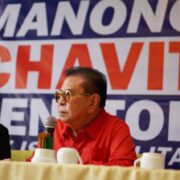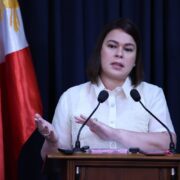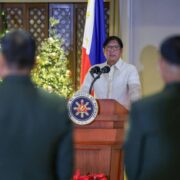Lawyer points out ‘constitutional infirmities’ in budget law

The 2025 General Appropriations Act (GAA) is rife with “constitutional infirmities,” on top of other economic and fiscal issues that indicate flaws in the budget process normalized under the Duterte and Marcos administrations.
This was according to a constitutional law expert, who nevertheless acknowledged the difficulty of challenging the national budget law before the court based on these infirmities.
These included declaring a budget bill urgent even though it had nothing to do with a public calamity or emergency and creating small committees to amend it after third reading approval.
Article VI, Section 26 of the 1987 Constitution states that no bill passed by either the Senate or the House of Representatives shall become a law unless it has passed three readings on separate days, except when the President certifies the necessity of its immediate enactment to meet a public calamity or emergency.
“Now the urgency, which is the exception, has to be a response to a calamity or emergency,” lawyer Michael Henry Yusingco, senior research fellow at the Ateneo Policy Center, told the Inquirer on Jan. 7. “But the budget process is done every year, it’s an annual activity already anticipated way ahead of time. Bottom line, the exception to the rule does not apply.”
“So the certification of urgency, which gave them the authority to do the second and third reading on the same day, that can be argued as a constitutional infirmity in the process,” he said.
Small committee
The Constitution also states that no amendment is allowed after the third reading. But Yusingco said this was violated by the creation of a small committee to amend the General Appropriations Bill (GAB) after it passed that supposedly final stage.
Normally, he said, the need for a small committee occurs after first reading and can still possibly happen after the second reading. “But after the third reading, everything closes. No chance for amendment, no chance for any changes at all, whether through a small committee or a special committee or through the [bicameral conference committee] for that matter.”
“That’s why it’s important also to say that the certification as urgent is unconstitutional, not just because it is unconstitutional, but because it prevented a more thorough deliberation of the budget bill,” he explained.
Yusingco acknowledged that this had been done before, but the practice seems to have become more common under the previous and current administrations where the President enjoyed supermajority support in Congress.
Overreaching mandate
Another “irregularity” in the 2025 GAA was the way the bicameral conference committee reconciled both chambers’ versions of the GAB to a point that may have overreached their own mandates.
He said the committee’s authority is limited to reconciling differences in the two versions. However, the last panel, through a technical working group, reduced the budget of the Department of Education (DepEd) by P12 billion despite the line item being already approved by both chambers.
It also reduced to zero the subsidy for the Philippine Health Insurance Corp.
“So, if that act is challenged and the result is it would be overturned, the original budget proposals would be restored,” he said.
Yusingco, however, was skeptical about mounting a legal challenge to the 2025 GAA at this point, especially on the argument that education did not get the highest budgetary priority.
The 1987 Constitution, he said, just plainly used the word “education” and did not specify which government agencies or programs constituted the sector.
Fiscal experts have traditionally interpreted it to mean the DepEd, Commission on Higher Education, state universities and colleges, and the Technical Education and Skills Development Authority.
This year, however, Congress combined all education-related sectors and programs, including the budgets for the Philippine National Police Academy and the Philippine Military Academy.
Yusingco said such an interpretation could pass muster as “the Constitution does not provide any technical [or] special meaning to education. Unfortunately it now depends on who is drafting the budget to determine what falls under that umbrella term education.”
Form of pork barrel?
He said questioning the GAA based on these procedural infirmities might be difficult, as this could lead to the voiding of the entire budget law. If that happens, the government would have to reenact the 2024 budget.
It might be better to challenge the budget on a line-item basis, he said, citing the zero subsidy for PhilHealth or the P26-billion allotment for the Ayuda para sa Kapos ang Kita Program (Akap) under the Department of Social Welfare and Development (DSWD).
Lawmakers have repeatedly dismissed criticism that the aid program was another form of pork barrel as it did not meet the Supreme Court definition of a lump-sum discretionary fund and was not implemented by the DSWD. Pork barrel has been declared unconstitutional by the court in the 2013 Belgica case.
“But the defenders of Akap are being disingenuous here because in reality we know they would interfere, so obviously the Akap funds can be used like pork barrel,” he said.
These procedural irregularities highlighted the need to “return to the underlying principle of separation of powers as it no longer has strong presence in the process.”
“And that’s why we see these insertions like Akap, reductions out of the blue, and the bicam overstepping its authority, because it’s being tolerated by the leadership of the chambers,” he said. “Because this is what Malacañang wants, and therefore it has to be done.”
“The word they are even using is ‘cooperating,’ but what they are really doing is conniving and colluding to divvy up public funds for their own ends,” he said.

















